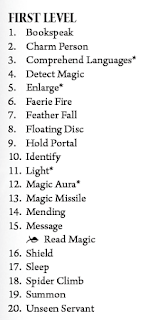I've been thinking about incompatible and non-comparable classes.
I had wanted to invert the paradigm of "complicated wizard, easy fighter." What if magic was freeform but combat had robust, powerful structures? What if the two were utterly incompatible and non-comparable?
No real point here. Just thinking out loud. On paper. Thinking quietly and writing.
Here are some ways to crunch up your combat systems
For each mechanic idea, I've provided a few example abilities/techniques. Please note that for a few techniques I use Grit/Flesh terminology.
Abstract
Your ability to use a combat ability is based on something outside of the game fiction. The Escalation Die in 13th Age is an example of this sort of mechanic.
Stormthane
If it is raining outside in the real world, you crackle with storm energy. Each attack does an additional +1d6 lightning damage and you gain +15 feet in movement speed from the storm's winds.
The Dwarf's Determination
Once per game session, give the GM a fancy beer you brought for him. Your next attack is an automatic crit.
Action
You can only use a particular combat technique if you first perform some other action. These mechanics can be interesting because 1) it incentivizes players not just to spam the attack action over and over and 2) it broadcasts what's coming to the table, who can make informed decisions based on that information.
As an example, imagine that you had a school of combat techniques with the "Assess" keyword. Assessing an opponent requires you to take a turn watching that opponent fight. You are considered "Assessed" towards that target until they leave your line of sight (run around a corner, go invisible) or are defeated. You can only be Assessed vs one target at a time.
Or, for another example:
Internal Alchemy
Spend a turn drinking an entire bottle of booze. You gain 4 drunkenness points. On the next turn, you can belch a fireball that deals 2d6 damage in a 30' cone.
Adjacent Ally
Ambush
Combo
Dual
Some techniques might require cooperation and coordination from 2+ people to use.
Fusion You and another player with this technique fuse together. Add your current HP totals together. While fused, you can only make action per turn and must agree about which action to take. You can make any action that either character could normally make.
Shard Dancer At the beginning of combat, designate another person with this technique as your dance partner by asking "Shall we dance?"
If you both elect to use your turns activating this technique, the person with the highest attack bonus makes an attack roll. This attack roll is applied to every adjacent enemy. If it would hit that enemy, that enemy takes 1d6 damage. Use the same damage roll against every enemy who is hit in this way.
Duel
Some abilities might only be useful when engaged 1x1 against a particular opponent. This is the opposite of "Flanking."
Thornhedge Challenge Only usable if engaged 1x1 with an enemy. Use this technique to summon thorns from the ground that Root your foe. They may spend their action to clear the thorns away or take 2d6 damage if they move without clearing the thorns.
Effect
Elemental
Engagement Status
Environmental
Salty Sea Dog's Stance You bob and weave like you're stumbling around the deck of a ship. Use your action to activate this technique. Until you next take an attack action, you gain +2 AC. This bonus increases to +4 AC if you're actually on a ship.
Dwarven Redoubt Stomp
Must be underground. Spend 1d6 Grit to raise a 5'x5' stone wall. Dwarves use this maneuver to brick up doorways if they ever retreat.
Flanking
Positioning
Sepulcher Strike While occupying the 3 squares behind a character, your attacks bypass Grit and go straight to Flesh.
Dragoon's DropIf attacking from above (e.g., dropping onto another, finishing a jump, flight), your opponent must save or fall prone in addition to the damage done by your attack.
Sequential
Slayer
Use this technique to make an attack a giant or giant-type foe. If successful, the giant is Tripped and takes 1d6 Grit damage.
Trap
Some abilities might be deliberately used but only activate on certain conditions. Similar to Action or Trigger techniques, but slightly different in the action economy. For example:
Premorzerak Mage Hunter
When you activate this ability, until the start of your next turn you may make a free attack action against anybody attempting to cast a spell within 60' of you by launching a throwing spike at them.
Fluttering Moth Defense You take a defensive stance when you activate this ability. The first time you are attacked while in this stance, you may redirect the attack against another target within range. Taking another action ends your defensive stance.
Trigger
Gattican Phoenix Tactics
If you ever suffer the Knockback effect, you choose which direction to move.
Warcry
These abilities can only be used if the player roleplays a particular phrase or incantation.
Haiku
Speak a haiku for the table. The GM will give you a +2/+4/+6 bonus damage for this attack based on how poetic, appropriate, and surprising the haiku is.
Flyt
Roleplay an insult to a target on the field. They have 5 seconds to come up with a retort. If they fail, regain 1d6 Grit.
Warlord's Tactics
Spend an action roleplaying giving a command to an ally. If they choose to follow your command, they can act on your turn to take an extra action.
Weapon and Armor Restrictions
Flying Spark Feint As you trade blows with your foe, you know the trick of sparking a spray of embers from blade on blade. If wielding a sword, you can attempt to blind your opponent. Spend 1d4 Grit and force your opponent to save. On a failure, they are blinded. They can re-attempt this saving throw at the end of each of their turns.
Catch Arrows If wearing no armor, you gain damage resistance X to missile weapons, where X equals your Dexterity bonus + level. If this ever reduces the damage of a missile weapon to 0, you catch the missile weapon.
Putting it all together
You wouldn't want to use all of these. Maybe none are appropriate for the sort of OSRish games I enjoy. But you can definitely infuse combat with a lot of decision touchpoints by writing a combat system using some of these, and that might be fun.
You can imagine a system where there are various schools of combat utilize one or two of these mechanics as gimmicks. For example, a berserker school that combines first strike (non-engaged), effect (in a rage), and trigger (taking effects while in a rage) mechanics. A berserker could wade into battle, immediately go berserk, do an immediate fuckton of damage, and have a lot of fun gimmicks that combo off of people trying to subdue/get away from him.
This class could be balanced by schools that deliberately worked within those constraints. There could be classes who complimented, contrasted, or resisted that particular type of attack.
Final thoughts
A few years ago I made an attempt a few years ago to write a complicated fighter. I don't know that I have another attempt in me.
There's a lot I like in this original monk class...
- A gimmick that I think is interesting is how the d4 works vs a d6 MD. Like magic dice, they are expended on a 4+. Therefore, monks have lower numerical effects than wizards but burn their dice less often.
- The qi die system is also interesting because doubles help you (new techniques!) but triples hurt you (enlighten your way to retirement). It's not ALL bad and you're incentivized to use more dice more often.
- Also, doubles come up more often because the die size is lower.
- I also think monks are interesting because it makes using combat maneuvers against [certain foes] way easier. It's less attacking and more [maneuvering].











